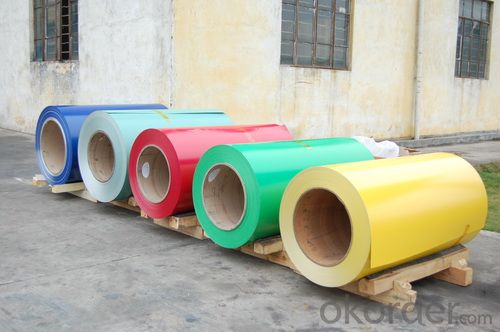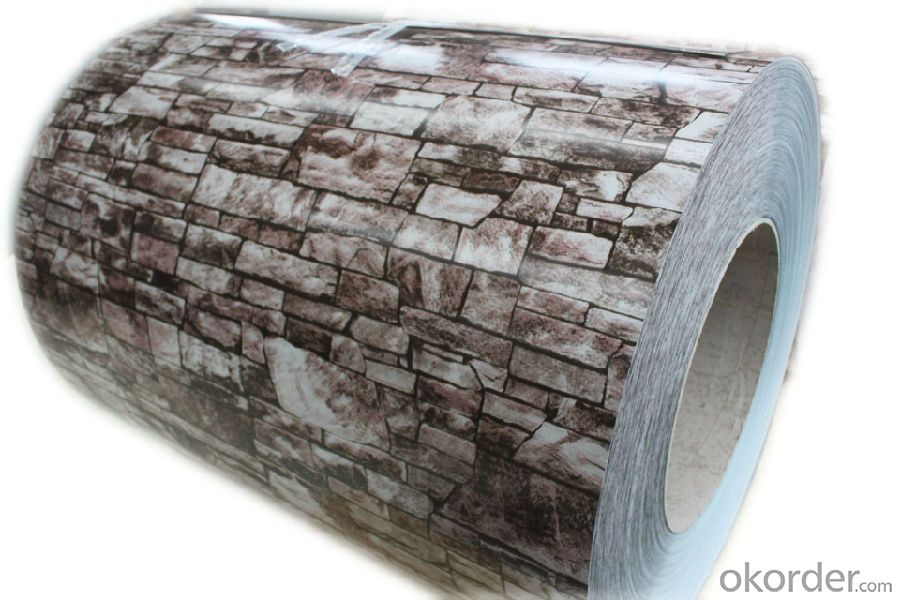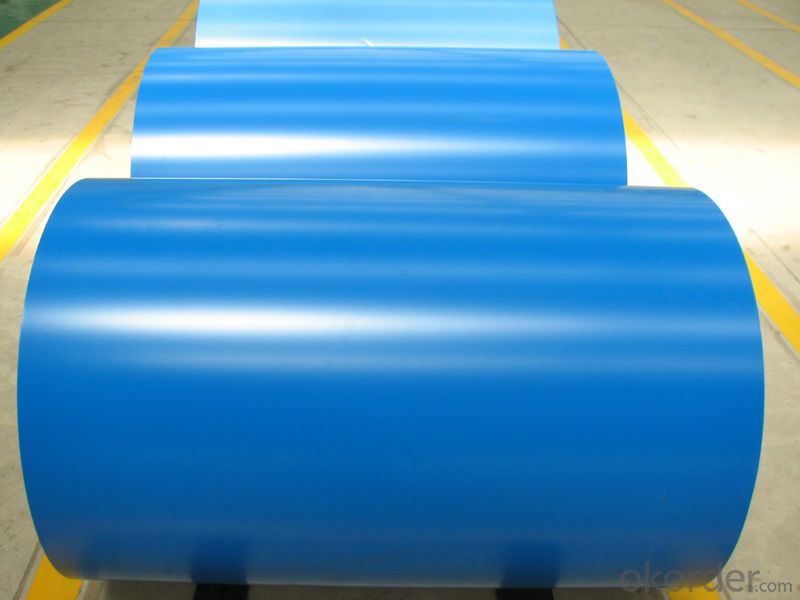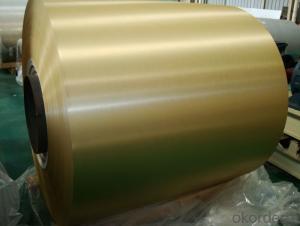Brushed Color Coating Aluminum Coil with High Quality
- Loading Port:
- Shanghai
- Payment Terms:
- TT OR LC
- Min Order Qty:
- 5 m.t.
- Supply Capability:
- 10000 m.t./month
OKorder Service Pledge
OKorder Financial Service
You Might Also Like
Item specifice
1. Specification of Brushed Color Coating Aluminum Coil with High Quality
Material | Alloy Aluminum 6063,6061,6005 or customer nominated |
Temper | T3, T4, T5, T6 |
Surface | Anodize, electrophoresis, powder coating, PVDF coating, wood grain painting, matted, etc. |
Colour | Any colour based on Standard Germany RAL Mark |
Length | Coating 6.5 meters, Anodizing 6.5 meters, Mill finish 5 meters |
Press Machine | 500-4000 tons all together 64 press lines. |
Fabrication | 1. Windows and doors; 2. Drilling; 3. Bending; 4. Cutting; 5. etc. |
Certificate | ISO 9001 |
Moulding | 1. Using our moulds, no fee; |
2. Using customer drawing, opening mould, usually about 10~50 tons then the moulding can be refunded. | |
3. Mould cost is negotiable base on the order quantity | |
Capability | Annual output 100,000 tons |
2. Application of Brushed Color Coating Aluminum Coil with High Quality
(1).Interior: wall cladding, ceilings, bathrooms, kitchens and balconies, shutters, doors...
(2).Exterior: wall cladding, facades, roofing, canopies, tunnels,column covers , renovations...
(3).Advertisement: display platforms, signboards, fascia, shop fronts...
3. Feature of Brushed Color Coating Aluminum Coil with High Quality
*Such coil is specially designed to replace aluminum ingot, due to the high export tax of aluminum ingot, the coil has better price than ingot.
*This type of coil can fit customer's remelting furnace just like ingot, no need to make any change to the production line that was previously used for ingot. The standard coil size and weight is very suitable for the feed gate of furnace.
*This type of coil causes less material wastage than ingot when remelted.
*Our coil is made directly from ore, no need to go though the ingot making process, quality is much better than other suppliers who use ingot scrap to make coil.
Be free from Oil Stain, Dent, Inclusion, Scratches, Stain, Oxide Dicoloration, Breaks, Corrosion, Roll Marks, Dirt Streaks and other defect which will interfere with use
4. Certificate:
SGS and ROHS(if client request, paid by client), MTC(plant provided), Certificate of Origin(FORM A, FORM E, CO), Bureau Veritas and SGS (if client request, paid by client), CIQS certificate
5. Image of Brushed Color Coating Aluminum Coil with High Quality



6. Package and shipping of Brushed Color Coating Aluminum Coil with High Quality
eye to wall
eye to the wall
with wood pallet (wooded case also available)
7. FAQ
1) What is the delivery time?
Dpends on actual order, around 20 to 35 days
2)What is the QC system:
We have QC staff of 20 persons and advanced equipment, each production is with MTC traced from Aluminum ingot lot.
3) What market do you mainly sell to?
Australia, America, Asia, Middle East, Western Europe, Africa etc
- Q:How do aluminum coils contribute to energy-efficient insulation?
- The role of aluminum coils in enhancing energy-efficient insulation cannot be overstated. To begin with, aluminum is an exceptional heat conductor, allowing it to effectively transfer heat away from its source and minimize heat penetration into insulated spaces. This quality ensures a stable and comfortable indoor environment, thereby reducing the need for excessive heating or cooling. Moreover, aluminum coils find extensive application in air conditioning and refrigeration systems, where they serve as the primary heat transfer medium. By efficiently absorbing and dissipating heat, these coils expedite the cooling process, resulting in reduced energy consumption and improved overall energy efficiency. Furthermore, the lightweight nature of aluminum makes it highly convenient for handling and installation in insulation systems. Its low weight provides flexibility and ease during manufacturing and transportation, leading to cost and energy savings. In addition, aluminum coils possess remarkable corrosion resistance, guaranteeing their durability and preventing the deterioration of insulation performance over time. This longevity ensures long-term energy efficiency as the insulation system remains effective without the need for frequent maintenance or replacement. In conclusion, aluminum coils significantly contribute to energy-efficient insulation through their effective heat conduction, facilitation of rapid cooling in air conditioning systems, reduced energy consumption, lightweight and easy handling, as well as long-lasting performance due to corrosion resistance. These qualities make aluminum coils the ideal choice for enhancing energy efficiency in insulation applications.
- Q:How are aluminum coils inspected for quality?
- To ensure the quality of aluminum coils, a series of rigorous tests and inspections are conducted. These inspections play a crucial role in meeting industry standards and specifications. Visual inspection is a commonly used method for examining aluminum coils. Trained inspectors carefully scrutinize the coils for visible defects like scratches, dents, or other physical imperfections that could impact the coil's quality. Specialized lighting and magnification equipment are used to achieve a thorough examination. Dimensional inspection is another important method. It involves measuring the dimensions of the coils and comparing them to specified tolerances. This ensures that the coils meet the required size and shape criteria. Coating inspection is also vital. It focuses on examining the aluminum coil's coating for uniformity, adhesion, and thickness. Specialized instruments are used to measure the coating thickness and ensure it meets the specified requirements. Furthermore, mechanical properties such as tensile strength, yield strength, and elongation are tested to evaluate the strength and durability of the aluminum coils. Samples from the coils are subjected to controlled stress, and their response is measured. Lastly, various non-destructive testing techniques are utilized to detect hidden defects or flaws that may not be visible to the naked eye. These techniques include ultrasonic testing, eddy current testing, and dye penetrant testing. They help identify internal defects like cracks or voids that could compromise the quality of the aluminum coils. In summary, a combination of visual inspections, dimensional measurements, coating inspections, mechanical property testing, and non-destructive testing techniques are employed to thoroughly inspect aluminum coils and ensure their suitability for use in industries like construction, automotive, and aerospace.
- Q:How can aluminium ingots be processed into aluminium coils (aluminium sheets)?
- This depends on what kind of ingot, and if it is small, it needs to be melted into a furnace, cast into a large plate, and then rolled on a mill
- Q:Can aluminum coils be used in roofing or cladding systems?
- Yes, aluminum coils can be used in roofing or cladding systems. Aluminum is a popular choice for these applications due to its lightweight nature and excellent corrosion resistance. Aluminum coils are commonly used in roofing and cladding systems to create a durable and long-lasting solution. They are often coated with a protective layer or finish to enhance their performance and aesthetics. Additionally, aluminum coils are easy to work with, making installation and maintenance convenient. Overall, aluminum coils are a suitable choice for roofing or cladding systems as they offer various advantages and meet the requirements of these applications.
- Q:Can aluminum coils be used in the production of automotive heat shields?
- Yes, aluminum coils can be used in the production of automotive heat shields. Aluminum is commonly used in heat shields due to its excellent thermal conductivity and lightweight properties. It helps to effectively dissipate and reflect heat, making it a suitable material for this application.
- Q:Can aluminum coils be used for aerospace applications?
- Yes, aluminum coils can be used for aerospace applications. Aluminum is widely used in the aerospace industry due to its lightweight, high strength-to-weight ratio, corrosion resistance, and excellent conductivity. Aluminum coils are commonly used in various aircraft components such as structural frames, fuselage panels, and wing structures.
- Q:How do aluminum coils contribute to energy savings in buildings?
- Aluminum coils play a vital role in HVAC systems for buildings, helping to save energy. To start, aluminum coils are highly effective at transferring heat. HVAC systems use these coils to facilitate the exchange of heat between indoor and outdoor environments. Aluminum's thermal conductivity allows for fast and efficient heat transfer, resulting in less energy needed to heat or cool a space. This means that HVAC systems equipped with aluminum coils can achieve the desired indoor temperature more efficiently, leading to energy savings. Furthermore, aluminum coils are lightweight and have excellent corrosion resistance. This property ensures the longevity and durability of the HVAC system, reducing the need for frequent replacements. By lasting longer, the energy and resources used in manufacturing new coils are saved, resulting in reduced energy consumption and environmental impact. Moreover, aluminum coils are highly recyclable. When an HVAC system reaches the end of its life cycle, the aluminum coils can be easily recycled and repurposed. Recycling aluminum requires significantly less energy compared to producing new aluminum from raw materials. By promoting recycling, energy is conserved, and greenhouse gas emissions are reduced. Additionally, aluminum's reflective properties contribute to energy savings in buildings. When used in HVAC systems, aluminum coils can reflect and deflect sunlight, reducing the amount of heat absorbed by the building. This reduces the workload on the HVAC system, resulting in lower energy consumption and increased energy efficiency. In conclusion, the use of aluminum coils in HVAC systems brings about energy savings in buildings due to their high thermal conductivity, lightweight and durable nature, recyclability, and reflective properties. By adopting aluminum coils, buildings can achieve optimal temperature control with reduced energy consumption, leading to significant energy savings and a more sustainable environment.
- Q:Can aluminum coils be used for heat exchangers?
- Indeed, heat exchangers can make use of aluminum coils. Aluminum has gained popularity as a favored option for heat exchangers owing to its exceptional thermal conductivity, light weight, and resistance to corrosion. These coils usually find application in scenarios where heat transfer is necessary, such as HVAC systems, refrigeration units, and automotive radiators. Aluminum's high thermal conductivity enables efficient heat transfer, while its corrosion resistance guarantees durability and an extended lifespan for the heat exchanger. Moreover, aluminum coils can be effortlessly molded into different shapes and sizes, thereby showcasing their versatility for various heat exchanger designs.
- Q:How do aluminum coils contribute to energy-efficient lighting systems?
- Due to its unique properties and functionalities, aluminum coils play a vital role in energy-efficient lighting systems. The conductivity of aluminum is exceptional, enabling efficient energy flow within the system. This ensures minimal energy loss during transmission, thereby maximizing the overall energy efficiency. Additionally, aluminum coils are lightweight and sturdy, making them perfect for use in lighting systems. The lightweight nature of aluminum allows for effortless installation and handling, ultimately reducing the energy needed during manufacturing and installation. Furthermore, the durability of aluminum guarantees that the coils can endure the demands of daily use without compromising performance, thereby contributing to the longevity and efficiency of the lighting system. Moreover, aluminum possesses excellent thermal conductivity, enabling efficient heat dissipation. In lighting systems, managing heat is crucial as excessive heat can diminish the lifespan and efficiency of bulbs. By utilizing aluminum coils, the heat generated by the lighting system can be effectively dispersed, minimizing the risk of overheating and ensuring optimal performance. To summarize, aluminum coils enhance energy-efficient lighting systems by providing efficient electrical conductivity, lightweight and durable construction, and effective heat dissipation. These properties help minimize energy loss, reduce energy requirements during manufacturing and installation, and enhance the overall efficiency and lifespan of the lighting system.
- Q:Can you create a tank, AFV, IFV etc. from aluminium or is this just a stupid idea that would kill everyone inside?
- Aluminium Armor
1. Manufacturer Overview |
|
|---|---|
| Location | |
| Year Established | |
| Annual Output Value | |
| Main Markets | |
| Company Certifications | |
2. Manufacturer Certificates |
|
|---|---|
| a) Certification Name | |
| Range | |
| Reference | |
| Validity Period | |
3. Manufacturer Capability |
|
|---|---|
| a)Trade Capacity | |
| Nearest Port | |
| Export Percentage | |
| No.of Employees in Trade Department | |
| Language Spoken: | |
| b)Factory Information | |
| Factory Size: | |
| No. of Production Lines | |
| Contract Manufacturing | |
| Product Price Range | |
Send your message to us
Brushed Color Coating Aluminum Coil with High Quality
- Loading Port:
- Shanghai
- Payment Terms:
- TT OR LC
- Min Order Qty:
- 5 m.t.
- Supply Capability:
- 10000 m.t./month
OKorder Service Pledge
OKorder Financial Service
Similar products
New products
Hot products
Hot Searches
Related keywords




























